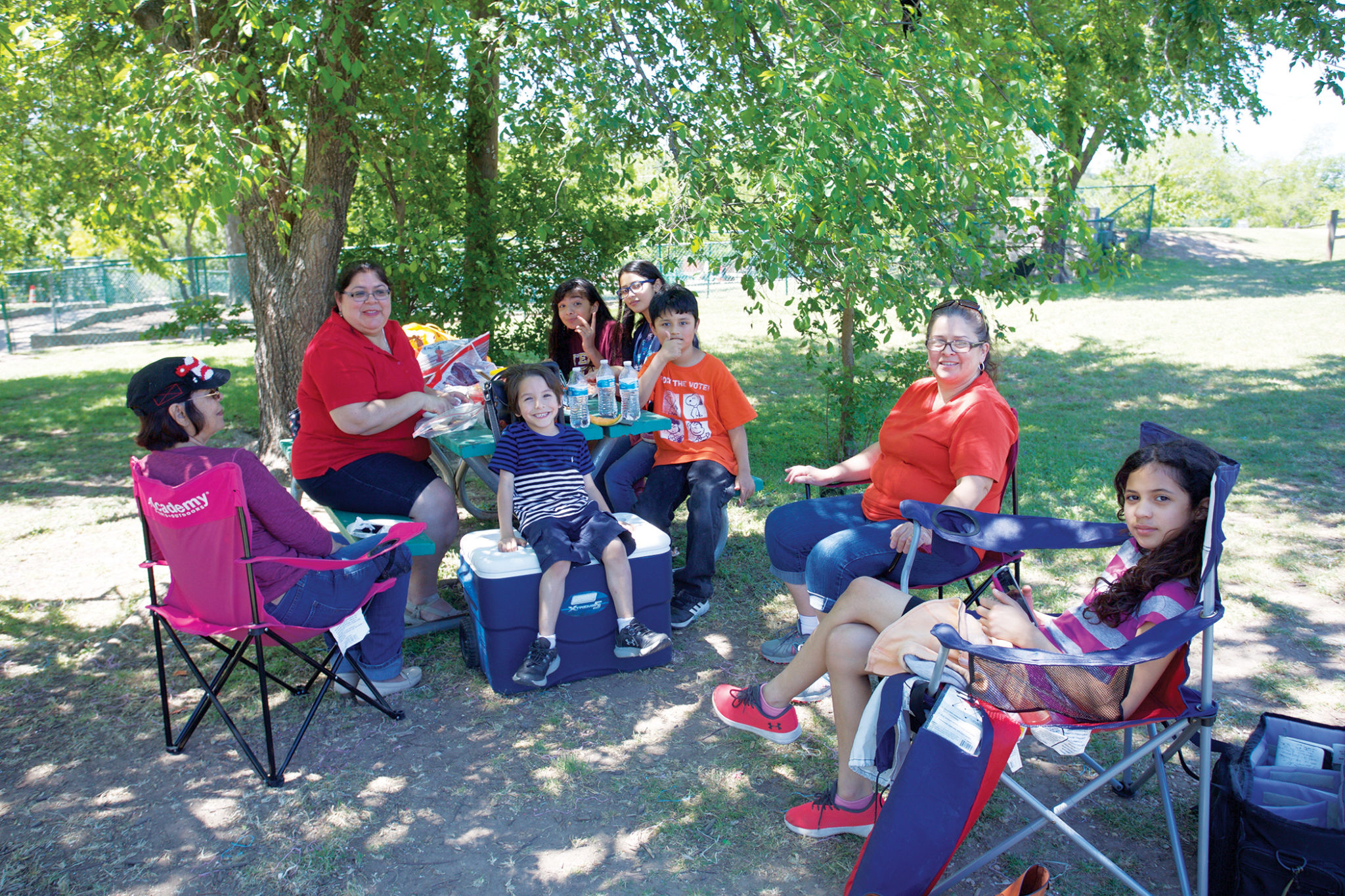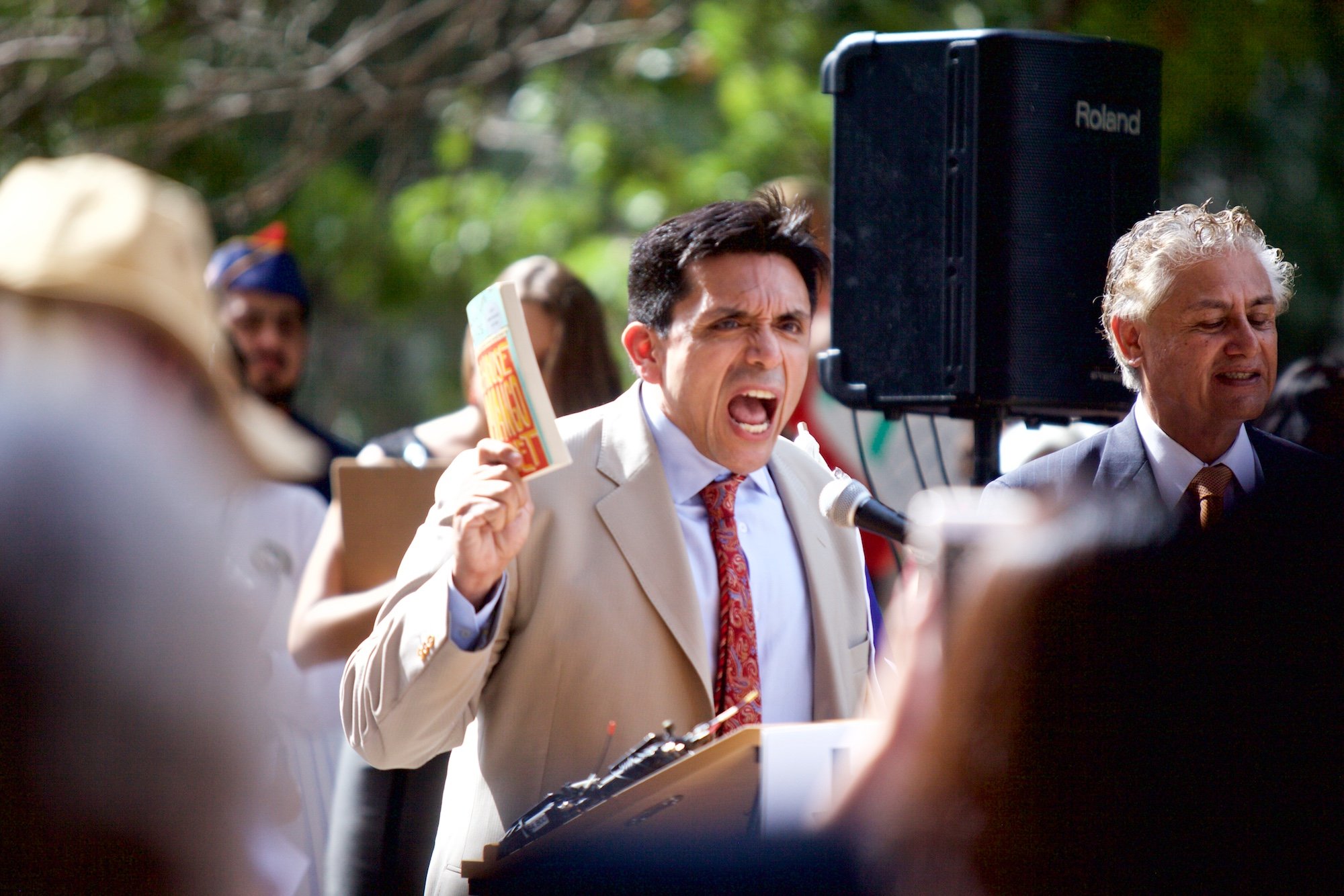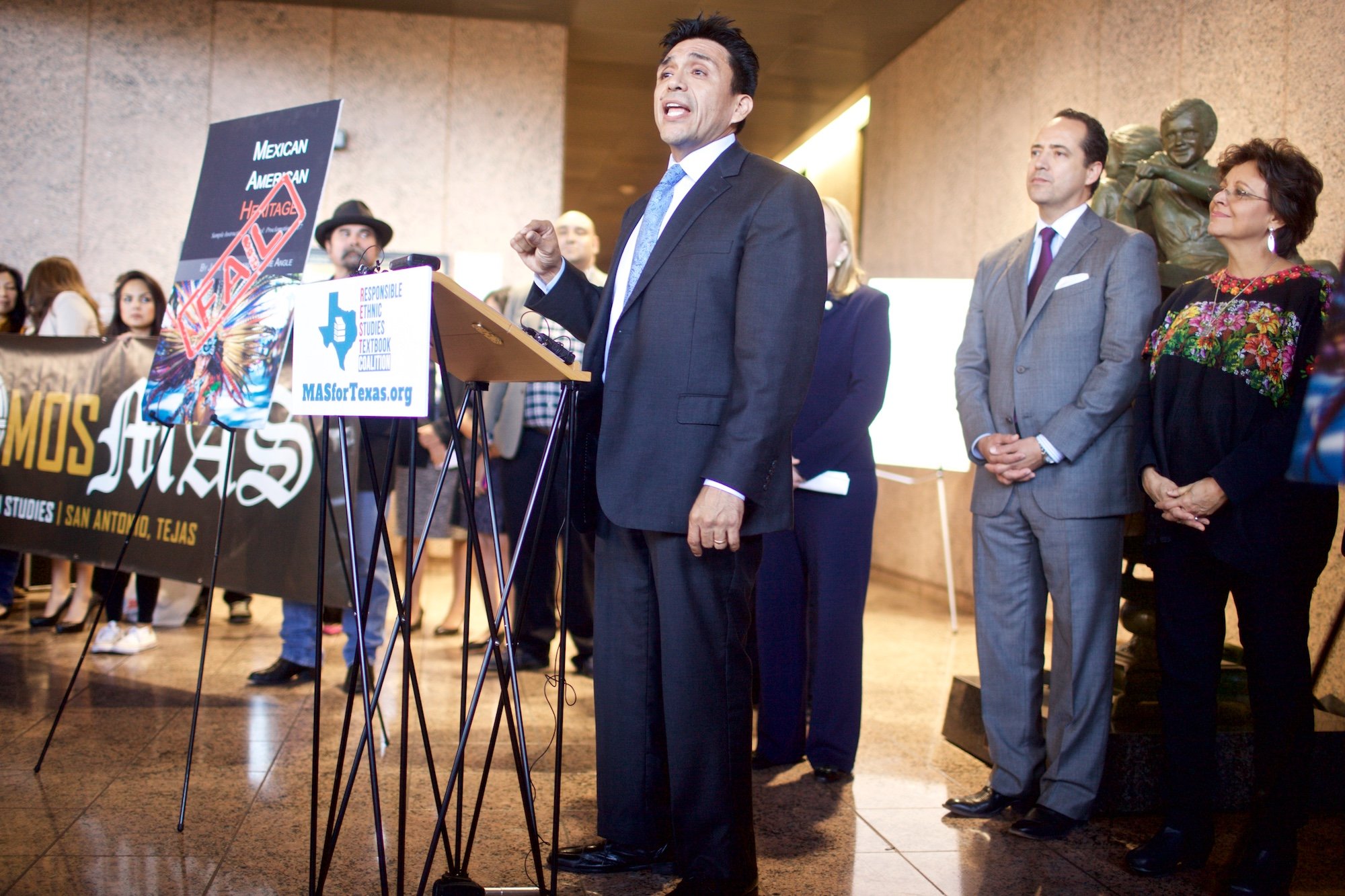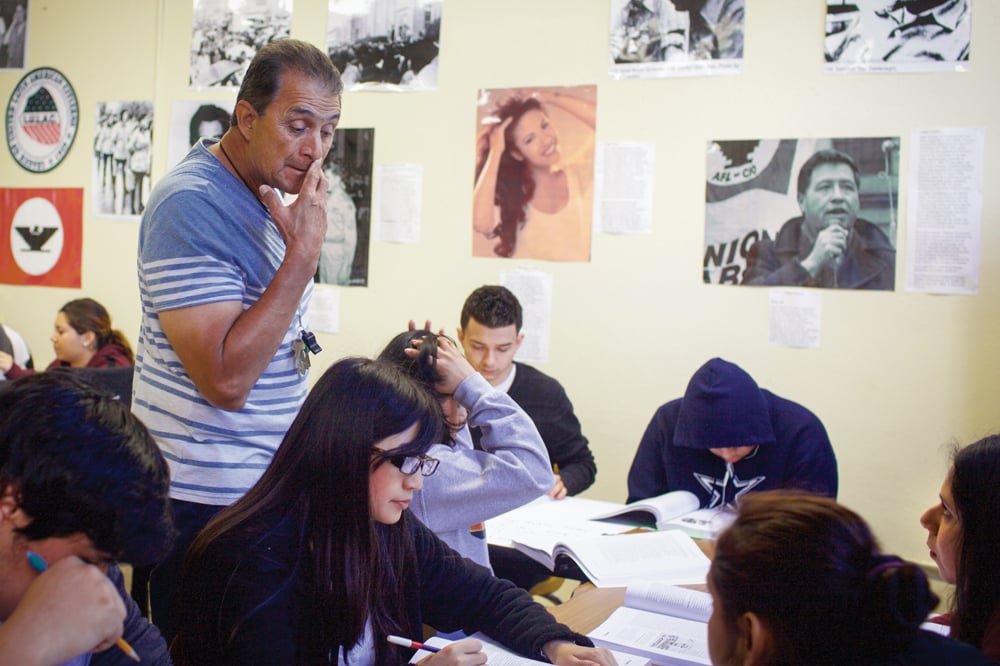
Another Strikeout for Mexican-American Studies in Texas
After another proposed textbook bites the dust, some are questioning the State Board of Education’s commitment to Mexican-American Studies.

Above: David Arriaga checks on students in his Mexican-American studies class at Houston’s Stephen F. Austin High School.
The Texas State Board of Education (SBOE) is no stranger to controversy. Its usual scandals involve questionable things the board or its members have done: placing Christian nationalists on an expert panel, warning of a “pro-Islam” bias in textbooks, calling Advanced Placement U.S. History un-American. The latest controversy, however, stems from what the board hasn’t done.
Three years ago, the Republican-dominated board — responsible for setting curriculum standards and adopting textbooks for the state’s 5.4 million public school students — responded to calls from dozens of Latino educators and activists for a Mexican-American studies (MAS) elective by inviting publishers to submit textbooks for adoption.
Two MAS books have since been submitted to the board for statewide adoption. The first was turned down by the SBOE last November after it was widely criticized as racist and error-ridden. Last week, by a vote of 13-1, the board rejected the second proposed textbook after expert reviewers concluded it wasn’t classroom-ready. The book’s author Tony Diaz, the “Librotraficante” leader who campaigned successfully against Arizona’s ban on MAS, blames deeper governance problems: a rushed adoption process, unclear guidelines and perhaps an unwillingness by some members to offer the course at all.
“Some of the board members tried to stress that their rejection of [the textbook] did not mean they were opposed to Mexican-American studies,” Diaz told the Observer. “Yet the actions of the [board] say otherwise.”
Now, in a state where 52 percent of public school students are Hispanic, the SBOE still has not approved instructional materials for MAS, which explores the history and culture of Mexican-Americans.
“With no other approved textbook for Mexican-American studies, teachers will continue to be hamstrung without specific guidance for course instruction,” said Brandon Rottinghaus, associate professor at the University of Houston’s Center for Mexican-American Studies.
Lilliana Saldaña, associate professor in bicultural-bilingual studies at the University of Texas at San Antonio’s Mexican-American Studies Program, cites a 2014 study that showed graduation rates for MAS students in Tucson were 8 percentage points higher than those for non-MAS students, and performance on the state’s standardized reading test were 5 percentage points higher. MAS students do better, Saldaña said, because they develop “a positive ethnic identity within a rigorous academic curriculum that promotes a new way of thinking and being in the world.”
“We want those results in Texas,” said Diaz, who is also an associate professor at Lone Star College.
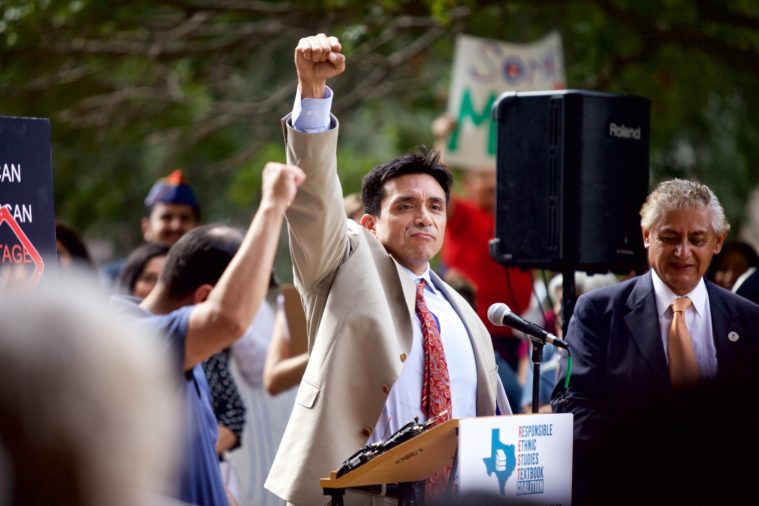
The board has been grappling with the issue since April 2014. Members heard several hours of testimony from supporters of a proposal from board member Ruben Cortez Jr., D-Brownsville, for a standalone MAS course, with its own set of curriculum standards (called “TEKS,” for Texas Essential Knowledge and Skills). “Our history is skewed,” one advocate told the board, “and as a result of this, bullying continues to invade our hallways with misrepresentations.”
Some GOP members didn’t like the idea of a MAS course, though. Pat Hardy, R-Weatherford, pronounced it “wrong” for curriculum to focus on one ethnic group. “We’re citizens of the United States, not citizens of Mexico,” Hardy declared.
At that 2014 meeting, the SBOE settled on a compromise. Instead of creating a separate MAS course, the board created a new ethnic studies elective and invited publishers to submit MAS textbooks as part of the course. As board member and El Paso Democrat Georgina Pérez put it, Latino advocates “asked for a course. They did not ask for a book. The board decided that a book was the way to go.”
However, the board gave publishers only broad guidelines for ethnic studies generally, and no specific guidance on content for MAS.
The first strikeout, an offering from the publishing house of former SBOE member and outspoken conservative Cynthia Dunbar, was called “deeply offensive” and “riddled with factual errors” by critics. Scholars pointed out that it perpetuated stereotypes of Hispanic people as lazy and characterized the Chicano movement as an attempt to undermine Western society.
Last November, the board rejected the Dunbar textbook and took the unusual step of reopening the call for ethnic studies materials. Yet the board gave publishers little time to react.
In a press release, SBOE chair Donna Bahorich, R-Houston, said it would be wrong to “accuse the Board of giving an unfair or limited opportunity to authors to write and publishers to submit materials for various ethnic studies.”
However, board member Marisa Perez-Diaz, D-Converse, said that while publishers typically have about two years to respond to a textbook call, the reopened November 2016 period “provided only [two months] to produce and propose materials.”
Once again, there was only one MAS submission, Tony Diaz’s textbook. One Jewish studies text, which was first published in 2009, was also submitted for the ethnic studies course, and it was ultimately adopted by the board last week by a 7-5 vote.
Diaz told the Observer that the two-month time frame “was a major limitation.” After several publishers told him the timeline was “impossible,” Iowa-based publisher Kendall Hunt took on the project.
However, scholars appointed by the board to review the Diaz text could not recommend it for adoption. The reviewers acknowledged the short time frame, but found the text had serious overall problems and left too many historical holes for classroom instructors to fill. Diaz worked with several scholars on last-minute changes to address these concerns, but could not convince the board that the text was ready for the classroom.
“The SBOE did him and the community a disservice by not providing the proper amount of time,” said Perez-Diaz, who reluctantly voted against adopting Diaz’s textbook.
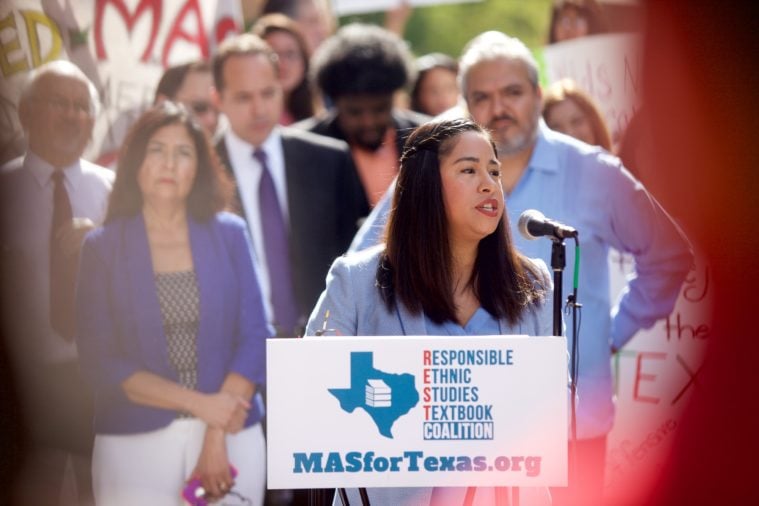
Some advocates blame the lack of curriculum standards for Mexican-American studies. The board “rejected pleas to establish specific curriculum standards that would attract reputable publishers,” said Dan Quinn of the left-leaning Texas Freedom Network. Board member Georgina Pérez echoed this point during last week’s hearings: “Publishers are not going to move unless [curriculum standards] are written for a course that is developed.”
Perez-Diaz agreed, saying the board “cannot continue to put the cart before the horse.”
“One can certainly criticize the Board for not developing a MAS course to date,” board chair Bahorich said in a press release. However, she contends, “one cannot deny … [the board’s] honest intention to fill a recognized need as quickly as possible.”
During last week’s hearings, board members from both parties did discuss the possibility of developing future standards for MAS based on a course developed by Houston ISD. Bahorich said she will place this topic on the January 2018 agenda. However, such standards would not be ready for board approval until fall 2020 at the earliest.
As for textbook author Tony Diaz, he remains optimistic — though guardedly so. “The fate of the Mexican-American studies movement does not rely on the Texas State Board of Education,” he said. “We will continue to write, publish and advocate. Our paths may cross again, but it is difficult to imagine when that may be, especially if the … SBOE does not really want to adopt Mexican-American Studies.”
